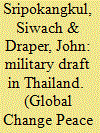| Srl | Item |
| 1 |
ID:
169169


|
|
|
|
|
| Summary/Abstract |
Thailand has had mandatory military service since 1905 and since 1954 via a lottery system. Beatings and deaths frequently occur among draftees, and photographs and videos in which draftees are injured, tortured, and humiliated are widespread. This article describes for the first time the development and nature of the Thai military draft. The authors analyse the military draft from a nonkilling global political science perspective and present a nonkilling rationale for ending the draft. The article argues that retaining the military draft promotes a killing society and violates human rights, including the right to conscientious objection; causes mental anguish; is inefficient economically; causes corruption; and supports military interventionism. The authors further maintain that physical abuse that has accompanied the Thai version of military conscription constitutes a pro-killing manifestation of the military regime’s approach to maintaining the existing institutional alignment and control in Glenn Paige’s ‘funnel of killing’. Instead, we recommend converting the draft to a national service program with civilian alternatives, together with conscientious objection as a right.
|
|
|
|
|
|
|
|
|
|
|
|
|
|
|
|
| 2 |
ID:
105235


|
|
|
|
|
| Publication |
2011.
|
| Summary/Abstract |
This article investigates the various conditions, external and internal, that have determined the contemporary conscription policies of Russia, and what conditions must exist should authorities desire to move toward an all-volunteer force. It starts with a brief examination of the historical background behind current Russian conscription policy, and later looks at contemporary Russian attitudes toward service and the institution of the army. Concerns regarding Russian national security posture and fiscal constraints are then addressed. Despite a shift in mentality among Russia's top leaders as to the orientation of their army's posture, real fiscal conditions limit the implementation of many reforms, including a shift to a more contractual and voluntary form of recruitment. Furthermore, the harsh conditions and sometimes criminal climate that populates Russian units serves as a real deterrent to attract qualified soldiers. Not only do current political sensitivities inhibit further reform, but also it is the culture amidst the army itself that needs modernization. For now, any transition to a more contractual and voluntary form of recruitment will depend on more favorable fiscal conditions and political will to transform age old Russian military climate into one founded on basic respect for others.
|
|
|
|
|
|
|
|
|
|
|
|
|
|
|
|